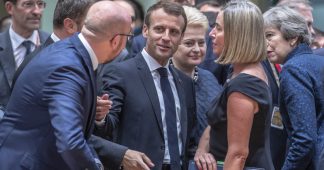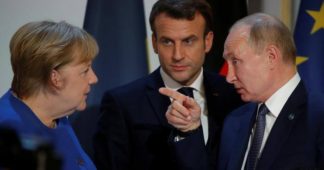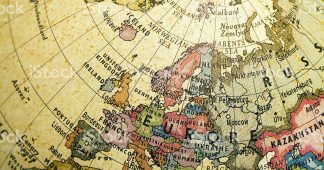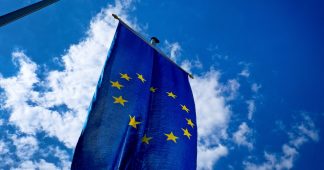French president Emmanuel Macron has renewed calls for the creation of a joint EU army. The proposal smacks of a desperate attempt to reverse the old European powers’ declining influence in global politics.
By Peter Wahl
Jan 4, 2021
“The idea that Europe is an exclusively ‘civilian power’ does not do justice to the emerging reality.” So wrote Federica Mogherini — at the time the European Union’s foreign affairs representative — in a Die Welt column back in July 2016. With transatlantic relations eroded over the following four years under Trump, the EU’s aspirations to become a military power only grew. Such calls have again gained traction as Emmanuel Macron’s France takes over the formal presidency of the EU for the first half of 2022.
This broad aim is in fact asserted by the European Commission’s own foreign policy guidelines, asserting that “Full spectrum defence capabilities are necessary to respond to external crises.” Indeed, when Ursula von der Leyen became Commission president in December 2019, she proclaimed that the EU “want[s] to be a strong geopolitical union,” and to do that it “must also learn the language of power.” Indeed, today there is hardly a statement from the EU institutions that does not express its longing to become a global power. It has almost become the gravitational field of Brussels politics — and individual policy areas are increasingly aligned with it.
This ambition also goes hand in hand with attempts to breed a kind of European patriotism in which supposed “European values” will foster a sense of superiority over the rest of the world. For example, Martin Schulz, in 2017 the German Social Democrats’ candidate for chancellor, declared the EU the “greatest civilizational project in the history of mankind.” His party colleague and erstwhile foreign minister Sigmar Gabriel similarly spoke of the “most successful project for freedom, peace and prosperity the world has ever known.”
The reason for this renewed European assertiveness lies in international upheavals. The rise of China, the shift of the center of the world economy to Asia, and the renaissance of Russia as a great power — and, in all likelihood, also of India and other emerging economies — mark the end of an era. The five hundred years of colonialism, imperialism, and neocolonialism in which Europeans and their North American offshoots were able to impose their interests on the rest of the world are passé. But this isn’t the only reason the EU feels left out. Even under Joe Biden, the United States is committed to an “America First” policy that takes little account of what EU powers are thinking — as demonstrated by the withdrawal from Kabul and the submarine agreement with the UK and Australia.
In light of this, the left-liberal Die Zeit asks, “How is it possible that the EU is not in the great power league?” Apparently, such a status is also an affront to Europeans’ collective self-confidence — unable to get used to no longer being the center of the world. Yet plans are afoot to stop the decline, through what French president Emmanuel Macron has termed a bid for “strategic autonomy.”
Strategic Autonomy and Its Limits
This also reveals one of the two major barriers to Brussels’ wishful thinking. NATO, in which Washington — actually a geopolitical competitor — calls the shots, imposes strict limits on genuine autonomy. For example, the Lisbon Treaty already stipulates that member states’ security and defense policy must be “consistent” with NATO (article 42.7).
The second major barrier is the heterogeneous interests of the member countries. This starts with the small fact that some EU members (Finland, Sweden, Austria, Ireland, and Cyprus) are not NATO members, whereas the UK, Norway, and Iceland are in NATO but not in the EU. One concrete manifestation of this is that Finland is ordering sixty-four F-35A stealth jets from the US firm Lockheed Martin for $10 billion, while EU-based competitors like Airbus’s Eurofighter and France’s Rafale have been rebuffed. Another telling case is the Tempest fighter planned by the UK together with Italy (Eurozone) and Sweden (an EU member with its own currency). Poland has also recently purchased thirty-two fighter jets from the United States. There is no end in sight to the complex crisscross of competition for defense profits, national security interests, and supranational integration attempts.
There are also considerable differences in the perception of friend, foe, and ally. In Poland and the Baltic states in particular, a mixture of extreme nationalism and hysterical Russophobia predominates. This is often justified by historical experience. However, a look at the centuries-long “age-old enmity” between France and Germany shows that such extreme ideological hostilities can be overcome if the political will is there.
The differences also find expression in a particular closeness of the EU’s eastern member states to NATO and the United States, in contrast to Western Europe’s relationship to them, exemplified by a French president who speaks of NATO going “brain-dead.” The most spectacular example of these differences was Washington’s 2003 war against Iraq, in which eastern countries soon to become EU member states (Bulgaria, Czech Republic, Estonia, Hungary, Latvia, Lithuania, Poland, Romania, Slovakia) joined George W. Bush’s “coalition of the willing,” while France and Germany did not.
These differences also play a major role in the current crisis over Ukraine. While governments in Poland and the Baltics are stoking aggressive sentiment against Moscow — with rhetorical support from German foreign minister Annalena Baerbock (a Green) — the good news is that Macron and Germany’s new chancellor Olaf Scholz are seeking de-escalation. The German government’s communiqué on the phone call between Scholz and Vladimir Putin is demonstratively matter-of-fact, arguing for the implementation of the Minsk ceasefire agreement, which Kyiv is desperate to get rid of, and for the resumption of talks in the Normandy Format (a four-way process involving France, Germany, Russia, and Ukraine). Apparently, an informal decision has been made in Berlin that Scholz (just like Angela Merkel before him) should retain prerogative over the most important foreign relations.
Ultimately, this is also reflected in what joint military capabilities exist so far, or are at least planned with some degree of commitment.
Militarization Through PESCO
First, in terms of integration policy, this is a flexibilization of integration toward a “multispeed Europe.” This creates different categories of member countries in addition to existing fragmentations in the EU, such as divides of center-periphery, north-south, east-west, Eurozone-non-Eurozone, etc. In contrast to the similar procedure known as Enhanced Cooperation (based on a minimum quorum of nine member states), in which the failed project of a financial transaction tax was negotiated, just two partners are sufficient for PESCO. In this respect, the complicated problem of multilevel governance is bypassed from the outset.
Second, the member states that meet “more demanding criteria” are, of course, the large and economically mighty countries — first and foremost, France and Germany, and, in the second rank, Italy and Spain. This solidifies the informal power hierarchy with Berlin and Paris at the top. Among the many other democratic deficits, this quasi-imperial power imbalance is one of the EU’s greatest democratic defects. Indeed, all major PESCO projects are concentrated around France and Germany.
So far, there are forty-seven projects in various coalitions. These include a joint medical command, bug-proof radio technology, and military training centers. The creation of a joint high command has also been announced. However, only three armament projects are really strategically relevant:
- A combat aircraft, the Future Combat Air System, to be produced mainly by France and Germany (Dassault and Airbus), with Spanish participation. The jet is to fly in tandem with combat drones and microdrones, as well as with its own digital cloud. It is expected to be available from 2040. Estimates of its cost currently range from €100 billion to €300 billion.
- A new Main Ground Combat System, also a Franco-German project. The German partner is KraussMaffei; the French partner is the Nexter defense company. Entry into service is scheduled for 2035. Its unit price currently stands at €10 million.
- The so-called Eurodrone, in which France, Germany, Italy, and Spain are involved. Airbus is the leader of the consortium, which includes Dassault and the Italian defense company Leonardo. Seven systems, each with three drones, have been ordered so far. The price tag is said to be €7.1 billion, with delivery scheduled for 2029.
Taken on their own, these projects may look impressive. But in a global context, they hardly fulfil the goal of giving the EU world-power military capabilities.
Finally, in its rivalry with Germany for leadership of the EU, France sees the military as a means of compensating for the Germans’ economic dominance. Brexit has changed the power architecture at the top of the EU. The departure of the British also saw a nuclear power and a permanent Security Council member leaving the EU. But nuclear weapons are still the decisive criterion for membership in the premier league of geopolitics, thus handing Paris a monopoly position in the EU’s ranks as the only nuclear power and permanent member of the UN Security Council. Paris thus hopes to regain the leading role in European politics it enjoyed until German reunification. It has clearly rejected German attempts to have a say in France’s nuclear weapons and its seat on the Security Council.
Peace Policy?
But this will not solve the really big problems of the twenty-first century, which first and foremost means the climate crisis. To tackle this real threat to our safety, what is needed is a policy based on détente, cooperation, and peaceful coexistence. Instead of embarking on the futile endeavor of an army, the EU should instead reflect on Europe’s traditions of peace policy. From the Peace of Westphalia to Immanuel Kant’s Perpetual Peace to Social Democratic German chancellor Willy Brandt’s policy of détente, role models do exist. Peace is not everything — but without peace, everything else is impossible
Published at www.jacobinmag.com
We remind our readers that publication of articles on our site does not mean that we agree with what is written. Our policy is to publish anything which we consider of interest, so as to assist our readers in forming their opinions. Sometimes we even publish articles with which we totally disagree, since we believe it is important for our readers to be informed on as wide a spectrum of views as possible.











